Progress slow, but steady on saving rare turtles
MARION — In late May and early June at a private salt marsh in Mattapoisett, rare turtles called the diamondback terrapins will poke their heads out of the mud to emerge after a long winter hibernation. The turtle, named for the diamond pattern at the top of its shell, is no bigger than 7.5 inches long.
After hibernation ends, female diamondback terrapins leave their muddy bed in Marion and Mattapoisett to lay eggs on nearby sandy beaches. Three to four months later, the eggs hatch.
Krill Carson, a whale wildlife biologist for the New England Coastal Wildlife Alliance (NEWCA), said that the turtles are greatly affected by coastal erosion, rising sea levels and development and struggling to find safe nesting grounds. The species, endangered in Rhode Island and threatened in Massachusetts, were believed extinct in Marion and Mattapoisett until 2003.
Because they cannot reach their natural habitat, these turtles try to nest in the backyards in both Marion and Mattapoisett, a far cry from their original targets.
Director of the organization’s Diamondback Terrapin Project, Dani Marston has been working with the federally protected species since 2016.
Many tri-town residents don’t know about the terrapins because they are reclusive and difficult to spot. Marston aims to change that.
“The people who live around here should know what’s in their backyard,” said Marston, “It’s an absolutely amazing, beautiful species of turtle. You see them and you immediately fall in love with them.”
Marston is also doing what she can to raise awareness on the species through education and outreach programs, even going to Marion on April 24 to discuss the species and the organization’s work with them.
NEWCA also puts up posters with a picture of the turtle and what to do if someone spots one.
“We want to get input and sightings from the community members,” said Carson.
To help protect the turtles, NEWCA scientists map beaches where they are found and do surveys on their habitat’s vegetation.
In the late summer and early fall, Carson and Marston travel to Aucoot Marsh and The Cove’s Turtle Garden in Marion and in a salt marsh in Mattapoisett to observe and track the turtles’ behavior.
Whenever the organization receives a call from someone who spotted a turtle nesting, NECWA travels to the location, ready to rescue the turtle and move the eggs to a safer nesting site.
Marston hopes to one day make more turtle gardens for nesting turtles, map beaches with drones, and make special cages to protect nests. NECWA is still trying to find ways to fund these projects.
Mattapoisett or Marion residents who spot diamondback terrapins, dead or alive, are advised to take photos and call NECWA at (508)-566-0009 with the date and time of their spotting and their location.
For more information on the project, go to necwa.org/stp.html.















